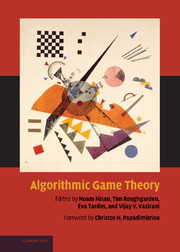Book contents
- Frontmatter
- Contents
- Foreword
- Preface
- Contributors
- I Computing in Games
- II Algorithmic Mechanism Design
- III Quantifying the Inefficiency of Equilibria
- 17 Introduction to the Inefficiency of Equilibria
- 18 Routing Games
- 19 Network Formation Games and the Potential Function Method
- 20 Selfish Load Balancing
- 21 The Price of Anarchy and the Design of Scalable Resource Allocation Mechanisms
- IV Additional Topics
- Index
19 - Network Formation Games and the Potential Function Method
from III - Quantifying the Inefficiency of Equilibria
Published online by Cambridge University Press: 31 January 2011
- Frontmatter
- Contents
- Foreword
- Preface
- Contributors
- I Computing in Games
- II Algorithmic Mechanism Design
- III Quantifying the Inefficiency of Equilibria
- 17 Introduction to the Inefficiency of Equilibria
- 18 Routing Games
- 19 Network Formation Games and the Potential Function Method
- 20 Selfish Load Balancing
- 21 The Price of Anarchy and the Design of Scalable Resource Allocation Mechanisms
- IV Additional Topics
- Index
Summary
Abstract
Large computer networks such as the Internet are built, operated, and used by a large number of diverse and competitive entities. In light of these competing forces, it is surprising how efficient these networks are. An exciting challenge in the area of algorithmic game theory is to understand the success of these networks in game theoretic terms: what principles of interaction lead selfish participants to form such efficient networks?
In this chapter we present a number of network formation games. We focus on simple games that have been analyzed in terms of the efficiency loss that results from selfishness. We also highlight a fundamental technique used in analyzing inefficiency in many games: the potential function method.
Introduction
The design and operation of many large computer networks, such as the Internet, are carried out by a large number of independent service providers (Autonomous Systems), all of whom seek to selfishly optimize the quality and cost of their own operation. Game theory provides a natural framework for modeling such selfish interests and the networks they generate. These models in turn facilitate a quantitative study of the trade-off between efficiency and stability in network formation. In this chapter, we consider a range of simple network formation games that model distinct ways in which selfish agents might create and evaluate networks.
- Type
- Chapter
- Information
- Algorithmic Game Theory , pp. 487 - 516Publisher: Cambridge University PressPrint publication year: 2007
- 57
- Cited by

